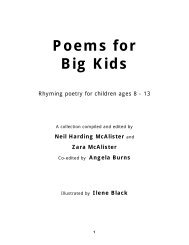New Classic Poems – Contemporary Verse That Rhymes
New Classic Poems – Contemporary Verse That Rhymes
New Classic Poems – Contemporary Verse That Rhymes
You also want an ePaper? Increase the reach of your titles
YUMPU automatically turns print PDFs into web optimized ePapers that Google loves.
<strong>New</strong> <strong>Classic</strong> <strong>Poems</strong><br />
Appendix A<br />
Appendix A<br />
“<strong>Contemporary</strong> Formal Poetry” on-line contest rules<br />
M<br />
ost of the poems that appear in this collection<br />
were submitted in response to the following<br />
invitation, posted on the Internet between<br />
April and October 2004, soliciting entries for<br />
<strong>Contemporary</strong> Formal Poetry’s first on-line contest. The<br />
contest closed on 31 October 2004. Only one in six<br />
(approximately) of the many submissions received<br />
complied with all of the contest rules. The remaining<br />
majority of poems that we received did not qualify for<br />
inclusion in this contest, and were therefore declined,<br />
even though some of them were potentially worthy<br />
works within their own genres.<br />
Poetry Contest<br />
Formal Poetry only!<br />
IS POETRY DEAD<br />
If Henry Wadsworth Longfellow, Robert Service, Keats,<br />
Shelley, or Alfred Lord Tennyson were alive today, they<br />
might have trouble getting a masterpiece published. Of<br />
course there are brilliant exceptions, but frankly, we<br />
think that the predominating free verse genre,<br />
considered avant-garde in our Grandparents’ generation,<br />
is getting pretty stale. We’re tired of pretentious free<br />
verse that leaves the reader struggling to figure out what<br />
the author was really trying to communicate. We dislike<br />
choppy prose masquerading as “poetry.”<br />
Purely to encourage the noble tradition, resonance and<br />
grandeur of classical, formal poetic form, “<strong>Contemporary</strong><br />
Formal Poetry” is pleased to announce our first on-line<br />
poetry contest. You may get a place to post your own<br />
masterpiece with us on the Internet; you might even<br />
win some money.<br />
YES, PLEASE<br />
• If it rhymes and scans perfectly, is easy to read, and<br />
sounds good when read aloud, then this contest is<br />
for you!<br />
• AIM FOR A HIGH STANDARD. By way of<br />
examples, we’re looking for the next great poet in<br />
the formal, “Western” tradition <strong>–</strong> the next<br />
Wordsworth, the next Shelley, the next Longfellow,<br />
Rudyard Kipling, Edgar Allan Poe, or Coleridge.<br />
• Within reason, we also welcome “longer” poems <strong>–</strong><br />
300 words or more.<br />
• Ballads, narrative poetry, elegy, sonnets, epigrams,<br />
villanelles, epics, odes, rondeaus, sestinas, alphabet<br />
poetry, acrostics and other formal genres all<br />
welcome.<br />
• The genre may range from children’s bedtime<br />
poems to gothic; from heroic to nonsense verse;<br />
from “fireside poetry” to “cowboy poetry” <strong>–</strong> as<br />
long as the work is formal in structure.<br />
• If you expect to win anything, use formal<br />
punctuation.<br />
• If your poetry is serious, have something serious to<br />
say. Think of Longfellow and the other “fireside<br />
poets.” Aim for the big picture, the moral of the<br />
story.<br />
• No special consideration for youthful poets, but all<br />
ages are welcome.<br />
• <strong>Poems</strong> in English only. Contest open to persons of<br />
all nationalities.<br />
• Previously published and simultaneous submissions<br />
welcome. In such cases it is the poet’s<br />
responsibility to ensure that he or she has the right<br />
to allow us to post their work on the Internet.<br />
156



